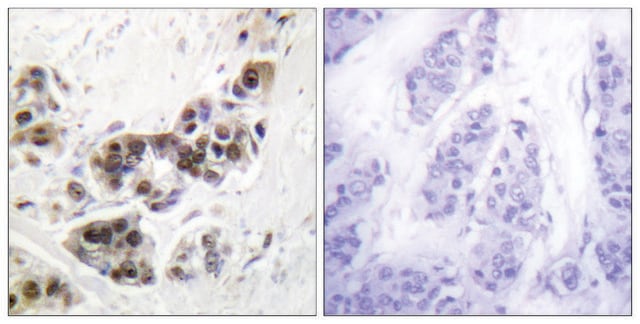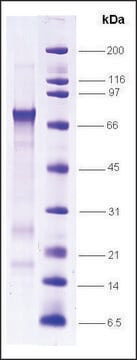P6374
p53 human
recombinant, expressed in baculovirus infected Sf21 cells
Sign Into View Organizational & Contract Pricing
All Photos(1)
About This Item
UNSPSC Code:
12352202
NACRES:
NA.25
Recommended Products
biological source
human
Quality Level
recombinant
expressed in baculovirus infected Sf21 cells
Assay
≥90% (SDS-PAGE)
form
aqueous solution
technique(s)
dot blot: suitable
UniProt accession no.
application(s)
genomic analysis
shipped in
dry ice
storage temp.
−70°C
Gene Information
human ... TP53(7157)
Looking for similar products? Visit Product Comparison Guide
General description
p53 protein is composed of an N-terminal domain with a transactivation domain and proline-rich region, a central core-DNA binding domain, and a C-terminal domain with tetramerization and regulatory domains. The TP53 gene which encodes for the p53 protein is mapped on the human chromosome at 17p13.1.
Application
p53 human has been used in dot blot.
Useful for the study of postranslational modification of p53, or protein-protein interaction studies.
Biochem/physiol Actions
In addition, p53 was recently shown to induce differentiation of human embryonic stem cells. The effect is dependent on the DNA binding activity of p53.
p53 gene is highly conserved and expressed in normal tissues. It is the most commonly mutated gene in human cancer and more then 500 gene mutations have been described in various types of malignancies, hematologic as well as solid tumors. Intact p53 function is essential for the maintenance of the non-tumorogenic phenotype of cells. Thus, p53 plays a vital role in suppressing the development of cancer.
p53 protein acts as a transcription factor that participates in regulating positively or negatively the expression of several responsive genes. It plays a role in regulating angiogenesis, cellular senescence, autophagy, cell survival, differentiation, and oxidative stress. Mutations in the TP53 gene lead to Li Fraumeni cancer syndrome.
Physical properties
Histidine-tagged, full length human p53
Physical form
Supplied as a solution in 20 mM Tris-HCl, pH 8.0, 20% glycerol, 100 mM KCl, 0.2 mM EDTA, and 1 mM DTT.
Storage Class Code
10 - Combustible liquids
WGK
WGK 3
Flash Point(F)
Not applicable
Flash Point(C)
Not applicable
Certificates of Analysis (COA)
Search for Certificates of Analysis (COA) by entering the products Lot/Batch Number. Lot and Batch Numbers can be found on a product’s label following the words ‘Lot’ or ‘Batch’.
Already Own This Product?
Find documentation for the products that you have recently purchased in the Document Library.
p53: structure, function and therapeutic applications
Bai L and Zhu W
Journal of Cancer Molecules, 2(4), 141-153 (2006)
Adam Shlien et al.
American journal of human genetics, 87(5), 631-642 (2010-11-09)
DNA copy-number variations (CNVs) underlie many neuropsychiatric conditions, but they have been less studied in cancer. We report the association of a 17p13.1 CNV, childhood-onset developmental delay (DD), and cancer. Through a screen of over 4000 patients with diverse diagnoses
Cristian A Lasagna-Reeves et al.
Biochemical and biophysical research communications, 430(3), 963-968 (2012-12-25)
The tumor suppressor p53 plays an important role in genome integrity. It is frequently mutated in all types of human cancers, making p53 a key factor in cancer progression. Two phenotypic consequences of these alterations are dominant; a loss of
Fiamma Mantovani et al.
Cell death and differentiation, 26(2), 199-212 (2018-12-13)
Forty years of research have established that the p53 tumor suppressor provides a major barrier to neoplastic transformation and tumor progression by its unique ability to act as an extremely sensitive collector of stress inputs, and to coordinate a complex
Abhinav K Jain et al.
PLoS biology, 10(2), e1001268-e1001268 (2012-03-06)
Multiple studies show that tumor suppressor p53 is a barrier to dedifferentiation; whether this is strictly due to repression of proliferation remains a subject of debate. Here, we show that p53 plays an active role in promoting differentiation of human
Our team of scientists has experience in all areas of research including Life Science, Material Science, Chemical Synthesis, Chromatography, Analytical and many others.
Contact Technical Service








